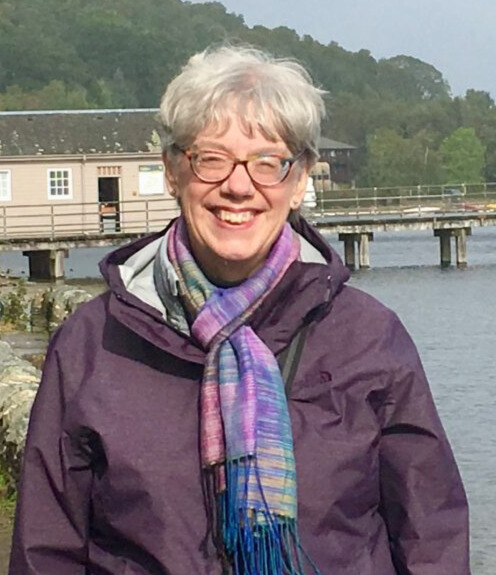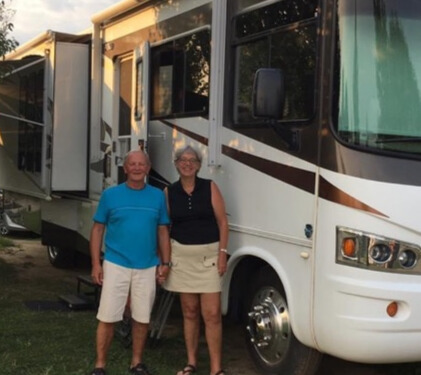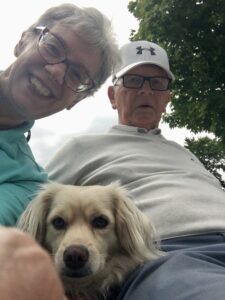
Joyce Luyckx enjoyed a career as a senior executive in finance and held several management roles in both for-profit and not-for-profit sectors. She is a co-caregiver for her elderly father as well as a care partner for her spouse with Alzheimer’s. Joyce is a firm believer in continuous learning, and she is interested in improving the lives of older adults as well as understanding how research can positively shape and address the growing needs of the aging population.
Fun Facts
Hometown: Edmonton, Alberta
Favourite vacation destination: My husband and I spent 2 and a half years living in our motor home traveling North America, which was amazing and I’m so glad we did that.
Hidden talent: Living in a motor home for two years! I also like to crochet.
Bucket list item: There are so many places in the world I’d like to travel to. But I’d like to get to visit the Southern hemisphere – like South America, Australia, New Zealand – at some point in my life.
Most prized possession: My husband

What life experiences do you think have shaped your contributions to the Collaborative most? And what impact do you think this has had?

Some of the experiences that have shaped my contributions at the Collaborative was being a distant caregiver to my aging parents when they lived in Edmonton, Alberta. I also have a sister who lives in Edmonton so, while l live in Ontario, we had to come together to collaborate and come up with a plan to support them and each other. It was very eye-opening when my Dad had to go into long-term care while my Mom stayed in their home by herself after years and years of being together.
My Mom passed away in 2021 due to Covid and we lost my Dad in May 2023. While they both lived to 93 and 94, respectively, they had good long lives. But to see the struggles in their later stages, you wonder what their quality of life was like for them.
I’m also a full-time caregiver to my husband who has been diagnosed with Alzheimer’s. And while I think I come to the Collaborative from different perspectives, learning about the experiences and challenges of other older adult partners, I now see my perspective is quite narrow. It is important that we have this diverse group and listen to others’ experiences to come to a consensus of what will help all of us as we age…as well as those who will come after us. Determining what’s going to make it good for all of us, I think, is a real challenge.
What does “quality of life” mean to you as an older adult? How has this differed as a younger adult?
As a younger adult, and even as a middle-aged adult, you think time is endless and that you’ll always be able to live that way. I think what my experiences have taught me is to realize that life is different when you’re older. The health challenges or economic issues you may face as an older person are different than when you were younger. It’s important to recognize that life has changed — and not just accept that that’s the way it is — but to still have things that give you enjoyment.
I think sometimes we’re not prepared for it. And It’s not necessarily just in our health care, or our retirement — I’m talking about being prepared for getting older in general and realizing, for example, “Okay, I can’t go downhill skiing anymore but what can I do in the winter that I enjoy and that will make me happy?”
And it’s also recognizing that there’s no stigma associated with that. One thing I did, and I’m so thankful I had the opportunity to do so, is retire at 55. Because my husband was turning 70, and we thought, “Well, if we don’t go and do the things we said we wanted to do in retirement now, our health and life could take over, and we may never get to do them.” And I’m so glad that I retired early, and that we had an opportunity to do some of those things that mattered to us.
What do you think are the most significant challenges that need to be addressed in health care to support your vision for aging?
I think the biggest significant challenge is home care (versus institutional care). I’m a big advocate that we should put more money into enabling people to stay in their homes. That may not necessarily mean that you stay in the house you’ve been in for the past 35 years, but you will still be able to have your belongings around you, your people around you — the things that are meaningful to you — and still have the health care you require.
It was very hard on my parents when they sold their home in their nineties and moved into an apartment, and then six months later, my Dad had to go into long-term care. And so, they were separated for the first time in their lives, both in two different environments. It really wasn’t fair. Why couldn’t my Dad stay with my Mom? Or there should be facilities where couples in their situation can stay together. The stress of after 67 years of marriage and all of a sudden being separated — it’s not right. And even though my Mom stayed at home, it was a new apartment for her too. And she had never lived on her own before. It was a very stressful transition for them.
Even if that means better subsidies to make changes to your home that meet the needs of these new challenges older adults may face, or better home care to help with different daily activities or care. Or supporting families more broadly, such as incentives for our youth and our children to help their aging parents and families. Family is very important. And it can be difficult for older adults to make new friends and maintain these close connections. For example, right now my daughter wants to help as much as she can but she’s raising two children and has a full-time job. But what kind of support is there for her to take a day or a week off to help? There are none.
Also, I think communication is very important in that…coming back to health care…you see different doctors for different reasons…but nobody’s talking to each other. And I know there is a shortage of doctors, and I especially feel for our family doctors because they’re trying to gather all this information from all these different sources so that they can see the full picture. But it’s a struggle to do that. You know, we hear from the cardiologist, for example, “I haven’t seen that report”. Everybody needs to communicate with each other. And sometimes it’s frustrating, because of privacy, which I can appreciate. But that can’t be an excuse every time. There should be some kind of central administration.
What advice would you give to researchers who are interested in partnering with older adults in aging-focused research?
Active listening: engage the older adults at the beginning, when they’re still conceptualizing their research project.
And sharing their perspectives and knowledge in a way that is educational for all involved. Find the middle ground between what the older adults’ needs are and what we are saying and what the researcher can do with the information that is out there, such as the data they’ll be looking at, to find that common ground of understanding.
I feel like I’ve learned a lot…Sure, I have life experiences, and I think it should be “this way”. But then, learning from the researcher, you gain a different understanding: I can see why that can be difficult; how can we work together to incorporate both perspectives and both be satisfied with the process and the outcome?
It’s not about being a participant in the research but being a partner in the research; having conversations from the inception of the project and all the way through. It’s about being engaged with the research too. It’s not just about the life experiences, it’s also recognizing the intelligence of the older adult. Avoid the misconception that once we reach our older years that we need to be “told” how to do something instead of working together to find a common understanding from both sides.
What three words would you use to describe your experience within the Collaborative?
Challenging, educational, and inspiring.
